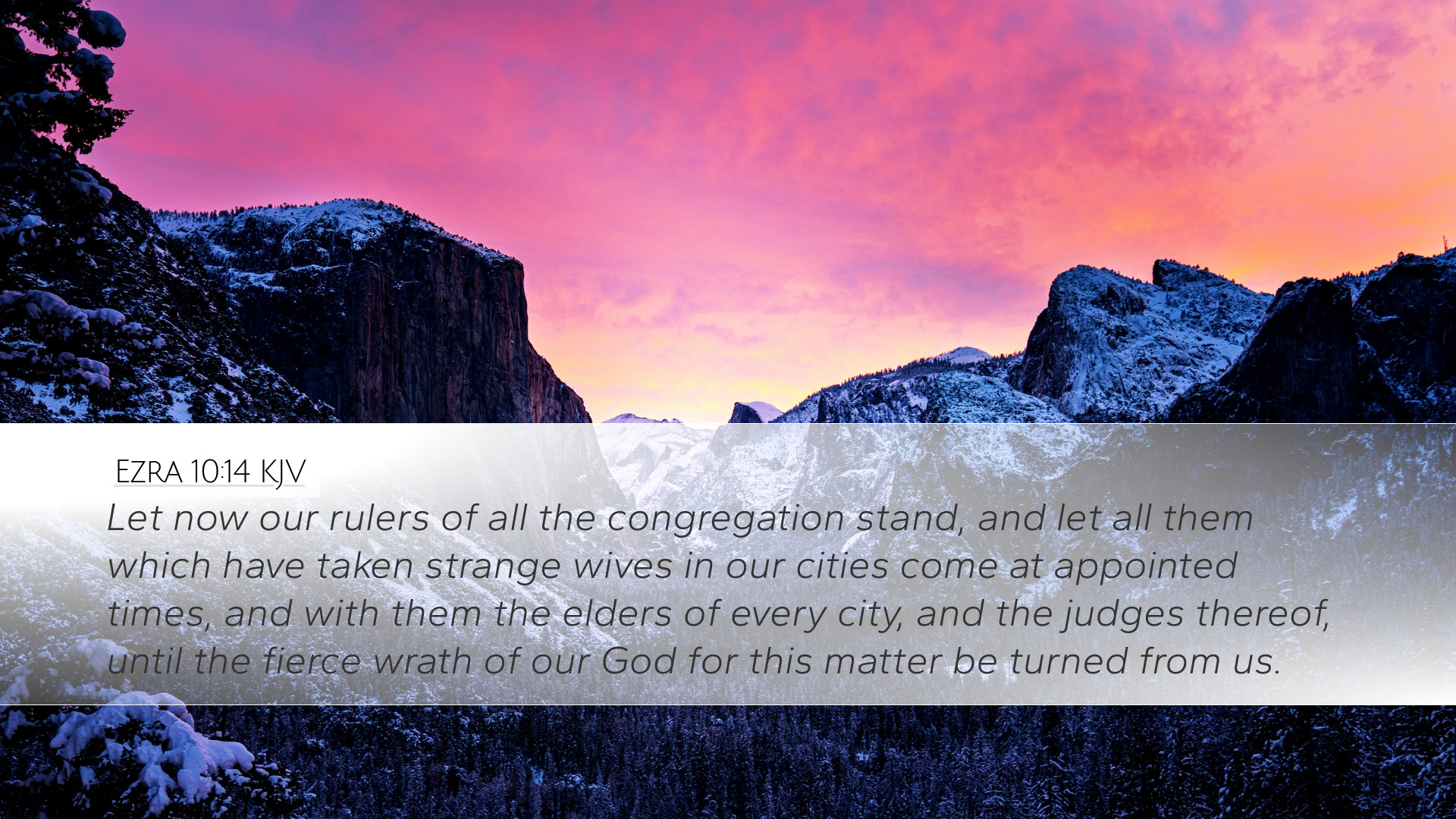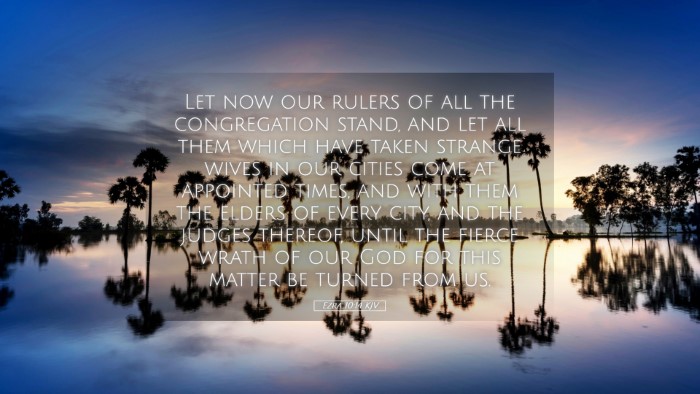Commentary on Ezra 10:14
Ezra 10:14 states: "Let now our leaders represent the whole assembly, and let all those in our cities who have taken foreign wives come at appointed times, together with the elders and judges of their cities, until the fierce wrath of our God is turned from us, till this matter is settled." This pivotal verse addresses the issue of intermarriage with foreign nations and reflects the broader themes of purity, repentance, and community leadership in the restoration period after the Exile.
Contextual Overview
The book of Ezra narrates the return of the Jewish people from Babylonian captivity and their efforts to rebuild the Temple and re-establish their national identity. Chapter 10 specifically deals with the repercussions of intermarriage, where Ezra, upon discovering that many returned exiles had taken foreign wives, called for a radical response to avoid divine wrath.
Insights from Matthew Henry
Matthew Henry highlights the communal aspect of the sin of intermarriage, emphasizing that it was not merely individual actions but a collective issue affecting the entire community. He underscores that leadership must take responsibility and act decisively to rectify the moral failures of the people. The elders and judges represent an organized approach to discerning and executing the necessary actions to restore order and faithfulness.
Insights from Albert Barnes
Albert Barnes notes the significance of gathering leaders and representatives to address the sin collectively. He reflects on the importance of accountability within the community and the acknowledgment of God’s anger as a motivator for urgent action. Barnes comments on how this moment reflects the gravity of spiritual leadership, which not only involves guiding but also correcting the wayward practices of the people to align with God's command.
Insights from Adam Clarke
Adam Clarke provides a detailed examination of the implications of intermarriage. He points out that such unions could lead to idolatry and a dilution of religious practices within Israel. Clarke emphasizes the importance of spiritual integrity and the necessity for decisive measures to prevent the influence of foreign customs and beliefs from eroding the faith of God's people. His commentary encourages a careful consideration of partnership and communion among believers.
Thematic Considerations
- Leadership and Responsibility:
The call for leaders to represent the assembly reflects the biblical principle that leadership entails responsibility for the spiritual wellbeing of the community. The actions of leaders, as demonstrated in Ezra's example, set the tone for communal attitudes toward obedience and repentance.
- Collective Repentance:
This verse illustrates the necessity of collective action in addressing sin. The leaders were called to engage the community in a process of repentance and rectification, which highlights the importance of communal solidarity in the face of national sin.
- The Seriousness of Sin:
Ezra’s response to the intermarriage crisis emphasizes the seriousness with which God views covenant violations. This awareness of God's fierce wrath serves as a sobering reminder to contemporary believers about the implications of disobedience and the need for holiness in personal and communal relationships.
- Judicial Leadership:
The involvement of judges and elders indicates the necessity of wise governance in spiritual matters. Their role is characterized by discernment and justice, which are essential for navigating the complexities of communal morality.
Application for Today
For modern pastors and theologians, Ezra 10:14 serves as a powerful reminder of the need for courage in addressing issues within the church that threaten spiritual integrity. Community leaders today can learn from Ezra's example to foster an environment that values accountability and mutual support.
Moreover, the emphasis on collective action in repentance urges churches to engage their members in recognizing and addressing sin not merely on an individual level but as a cohesive body. This fosters deeper relationships centered around shared faith and commitment to holiness.
Final Reflections
In the light of Ezra 10:14, we see a call to action that resonates through generations. It challenges us to confront the issues of our time with integrity, humility, and a commitment to God's standards. The role of leaders in spiritual matters remains vital, and through God’s guidance, we are encouraged to foster communities that honor Him in our actions and relationships.


